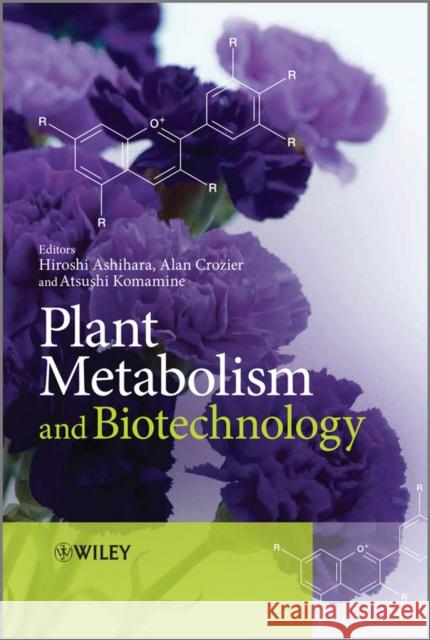Plant Metabolism and Biotechnology » książka



Plant Metabolism and Biotechnology
ISBN-13: 9780470747032 / Angielski / Twarda / 2011 / 424 str.
Plant Metabolism and Biotechnology
ISBN-13: 9780470747032 / Angielski / Twarda / 2011 / 424 str.
(netto: 655,02 VAT: 5%)
Najniższa cena z 30 dni: 682,14
ok. 30 dni roboczych.
Darmowa dostawa!
Various plant metabolites are useful for human life, and the induction and reduction of these metabolites using modern biotechnical technique is of enormous potential important especially in the fields of agriculture and health. Plant Metabolism and Biotechnology describes the biosynthetic pathways of plant metabolites, their function in plants, and some applications for biotechnology.
Wydanie ilustrowane
"Summing Up: Recommended. Upper–division undergraduates through professionals." (Choice, 1 January 2012)
List of Contributors xiii
Preface xv
1 Biosynthesis and Metabolism of Starch and Sugars 1
Frederik Börnke and Sophia Sonnewald
1.1 Introduction 1
1.2 Carbon Partitioning in Mesophyll Cells 2
1.3 Sucrose Biosynthesis in Source Leaves 3
1.4 Starch Metabolism in Source Leaves 7
1.5 Sucrose to Starch Conversion in Storage Organs 12
1.6 Metabolic Engineering of Carbohydrate Metabolism 14
1.7 Engineering Soluble Sugars 16
1.8 Production of Novel Carbohydrates in Transgenic Plants 17
1.9 Network Analysis of Carbohydrate Metabolism 18
Acknowledgements 19
References 19
2 Lipid Biosynthesis 27
David Hildebrand
2.1 Introduction 27
2.2 Fatty Acid Synthesis 29
2.3 Fatty Acid Desaturases 32
2.4 Lipid Signals 38
2.5 Algae 38
2.6 Membrane Synthesis 39
2.7 TAG Biosynthesis 43
2.8 Genetic Engineering of Oilseed for Industrial Uses 46
2.9 Plant Oils as a Renewable Resource 48
Acknowledgements 51
References 52
3 Symbiotic Nitrogen Fixation 67
Hiroshi Kouchi
3.1 Nitrogen Fixing Organisms and the Nitrogenase System 67
3.2 Symbiotic Nodule Formation in Legume Plants 70
3.3 Mutual Interactions between Host Cells and Bacteroids in Legume Nodules 76
3.4 Molecular Genetic Approaches to the Host Regulation of Nitrogen Fixation 83
Acknowledgements 92
References 92
4 Sulfur Metabolism 103
Hideki Takahashi
4.1 Introduction 103
4.2 Sulfate Transport 104
4.3 Sulfate Reduction 111
4.4 Cysteine Biosynthesis 114
4.5 Methionine Biosynthesis 117
4.6 Regulators for Coordination of Sulfur Metabolism 118
References 121
5 Nucleotide Metabolism 135
Rita Zrenner and Hiroshi Ashihara
5.1 Introduction 135
5.2 Pyrimidine Metabolism 136
5.3 Purine Metabolism 142
5.4 Pyridine Metabolism 149
5.5 Biotechnological Approaches 152
References 156
6 Purine Alkaloid Metabolism 163
Hiroshi Ashihara, Shinjiro Ogita and Alan Crozier
6.1 Introduction 163
6.2 Classification of Purine Alkaloids 166
6.3 Occurrence of Purine Alkaloids 166
6.4 Biosynthesis of Caffeine 167
6.5 Catabolism of Caffeine 171
6.6 Physiological and Ecological Aspects of Purine Alkaloid Metabolism in Plants 173
6.7 Metabolic Engineering of Caffeine In Planta 176
References 184
7 Nicotine Biosynthesis 191
Tsubasa Shoji and Takashi Hashimoto
7.1 Introduction 191
7.2 Pathways and Enzymes 192
7.3 Compartmentation and Trafficking 200
7.4 Gene Regulation 203
7.5 Metabolic Engineering 207
7.6 Recent Developments 208
7.7 Summary 208
References 208
8 Terpenoid Biosynthesis 217
Dae–Kyun Ro
8.1 Introduction 217
8.2 Terpenoid Diversity 218
8.3 Mechanistic Aspects of Terpenoid Biogenesis 222
8.4 Terpene Synthase Structure, Evolution and Engineering 223
8.5 Two Distinct Pathways for Isopentenyl Diphosphate (IPP) Biosynthesis 225
8.6 Subcellular and Cellular Compartmentalisations of Terpenoid Metabolism 228
8.7 Gene Clusters in Terpenoid Metabolism 230
8.8 Metabolic Engineering of Terpenoid Metabolism 231
8.9 Concluding Remarks 235
References 235
9 Benzylisoquinoline Alkaloid Biosynthesis 241
Isabel Desgagn´e–Penix and Peter J Facchini
9.1 Introduction 241
9.2 Biosynthesis 242
9.3 Localisation and Transport of Benzylisoquinoline Alkaloids and their Biosynthetic Enzymes 249
9.3.1 Cellular and Subcellular Localisation 249
9.3.2 Transport 251
9.4 Regulation 251
9.4.1 Gene Regulation 251
9.4.2 Signal Transduction 251
9.5 Application to Biotechnology 252
9.5.1 Mutagenesis 252
9.5.2 Genetic Transformation and Metabolic Engineering 252
9.5.3 Metabolic Engineering 254
9.6 Conclusions 254
References 254
10 Monoterpenoid Indole Alkaloid Biosynthesis 263
Vincenzo De Luca
10.1 Introduction 263
10.2 Monoterpenoid Indole Alkaloid (MIA) Biosynthesis 265
10.3 MIA Pathway Gene Discovery will be Enhanced by Large–Scale Sequencing and Comparative Analyses 271
10.4 Developmental and Environmental Regulation of MIA Biosynthesis 272
10.5 Metabolic Engineering using Enzymes with Altered Substrate Specificity 282
10.6 Conclusion 282
Acknowledgements 283
References 283
11 Flavonoid Biosynthesis 293
Indu B. Jaganath and Alan Crozier
11.1 Introduction 293
11.2 Advances in Molecular Approaches for Flavonoid Biosynthetic Pathway Elucidation 294
11.3 The Flavonoid Biosynthetic Pathway as it is Today 299
11.4 Conclusions 311
References 313
12 Pigment Biosynthesis I. Anthocyanins 321
Yoshihiro Ozeki, Yuki Matsuba, Yutaka Abe, Naoyuki Umemoto and Nobuhiro Sasaki
12.1 Introduction 321
12.2 The Anthocyanin Biosynthetic Pathway 322
12.3 Glycosylation of Anthocyanidins 325
12.4 Acylation of Anthocyanin Glycosides 327
12.5 Transport of Anthocyanins from Cytosol to Vacuoles 331
12.6 Concluding Remarks 335
References 336
13 Pigment Biosynthesis II: Betacyanins and Carotenoids 343
Masaaki Sakuta and Akemi Ohmiya
13.1 Betacyanins 343
13.2 Carotenoids 350
13.3 Metabolic Engineering of Carotenoids 357
References 361
14 Metabolomics in Plant Biotechnology 373
Yozo Okazaki, Akira Oikawa, Miyako Kusano, Fumio Matsuda and Kazuki Saito
14.1 Introduction 373
14.2 Analytical Technologies 373
14.3 Informatics Techniques 376
14.4 Biotechnological Application 378
Acknowledgements 381
References 381
Index 389
Various plant metabolites are useful for human life, and the induction and reduction of these metabolites using modern biotechnical technique is of enormous potential important especially in the fields of agriculture and health. Plant Metabolism and Biotechnology describes the biosynthetic pathways of plant metabolites, their function in plants, and some applications for biotechnology. Topics covered include:
- biosynthesis and metabolism of starch and sugars
- lipid biosynthesis
- symbiotic nitrogen fixation
- sulfur metabolism
- nucleotide metabolism
- purine alkaloid metabolism
- nicotine biosynthesis
- terpenoid biosynthesis
- benzylisoquinoline alkaloid biosynthesis
- monoterpenoid indole alkaloid biosynthesis
- flavonoid biosynthesis
- pigment biosynthesis: anthocyanins, betacyanins and carotenoids
- metabolomics in biotechnology
Plant Metabolism and Biotechnology is an essential guide to this important field for researchers and students of biochemistry, plant biology, metabolic engineering, biotechnology, food science, agriculture, and medicine.
1997-2026 DolnySlask.com Agencja Internetowa
KrainaKsiazek.PL - Księgarnia Internetowa









